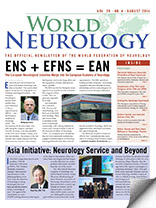FROM THE EDITOR-IN-CHIEF

Donald H. Silberberg
By Donald Silberberg
Since Josep Dalmau’s 2007 report of Anti-N-Methyl-D-Aspartate Receptor Encephalitis associated with ovarian teratoma1, there have been several studies that make it clear that he and his colleagues uncovered just the tip of the iceberg. Clinical presentations ranging from seizures, movement disorders, autonomic dysfunction, behavioral changes to frank psychosis and disordered consciousness are being reported in association with a variety of antibodies, mostly directed against synaptic molecules2. Some proportion of what is being termed Pediatric Autoimmune Neuropsychiatric Disorders (PANS) also may be antibody-mediated3.
Although these seem to be uncommon disorders, their epidemiology at present is unknown. However, as is the case with virtually all neurologic disorders, immune-mediated disorders are likely to be at least as common in low- and middle-income countries (LMCs). In those situations in which a preceding infection plays a role, these disorders may even be more common. Their recognition depends on physician or other health care provider awareness; diagnosis depends entirely on sophisticated laboratory testing. This raises the problem of how to get affordable diagnostics and interventions to LMCs where they are needed.
This problem, of course, extends far beyond this group of disorders. More than 100 genetically determined disorders can now be detected before birth. Even more neurologic disorders can be accurately diagnosed throughout childhood and adolescence where the genetic testing is available.
Advances in the capacity to deal with this issue in LMCs will depend on raising awareness at many levels, training diagnostic laboratory personnel, lowering the cost of the reagents that are needed, and through developing partnerships with centers in wealthy countries.
World Neurology Online welcomes your commentary concerning this issue.
References
1. Dalmau J, Tuzun E, Wu HY, et al. Paraneoplastic anti-N-methyl-D-aspartate receptor encephalitis associated with ovarian teratoma. Ann Neurol. 2007;61:25
2. Panzer JA, Gleichman AJ, Lynch DR. Glutamatergic autoencephalitides: an emerging field. Neuro Oncol. 2014 Mar 16. [Epub ahead of print]
3. Murphy ML, Pichichero ME, MD Prospective Identification and Treatment of Children With Pediatric Autoimmune Neuropsychiatric Disorder Associated With Group A Streptococcal Infection (PANDAS). J Neural Transmission. 2014 Jan 9 [Epub ahead of print]
